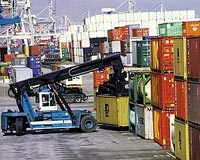 |
Dar Es Salaam (AFP) April 2, 2011 A soda ash mining plant planned for Tanzania's Lake Natron, the breeding ground for all of east Africa's endangered lesser flamingoes, must go ahead, President Jakaya Kikwete said Saturday. "There is no need for further delay of the project, which will give the country's economy a big boost," Kikwete said. Kikwete, who was addressing officials at the trade and industry ministry, said Lake Natron's reserves of soda ash deposits were big enough to make Tanzania the world's leading producer of the product. The plant, which will be able to process up to 500,000 tonnes of soda ash annually, has attracted criticism from environmentalists who argue the project and its associated infrastructure will destroy the flamingoes' breeding ground. Like all flamingoes the birds lay a single egg on a mound of mud. Kikwete argued, however, that destruction of the breeding grounds could be avoided. "We cannot continue with poverty while we have vast resources, including our minerals that are lying untapped. We can just apply the right technology that is not harmful to flamingoes," he said. Industry minister Cyril Chami has said that the relevant environment and social impact assessments should be completed by the end of April. The plant, which is to be built and operated by Tata Chemicals of Mumbai, and which will feature a grid of pipes running across the lake as well as infrastructure for workers on the shore, was put on hold in 2008 on environmental concerns.
earlier related report "We kindly ask you not to grant any environmental permit to the Rosia Montana gold mine project", the Pro Patrimonio Foundation and the ARA association that gathers Romanian architects and historians said in a open letter to the minister of Environment Laszlo Borbely. "Open air mines will be located on historical sites like Mount Carnic and Mount Orlea according to the project", the NGOs added, underlining that these two sites housed galleries dating back to Roman times. According to them, such a gold mine would "mean partial or total destruction of historical sites." Rosia Montana, a picturesque Carpathian mountain village, is said to hold one of the biggest gold deposits in Europe. In 1999, RMGC, a subsidiary of Canadian firm Gabriel Resources, obtained a licence to mine gold there through its sister company Rosia Montana Gold Corporation (RMGC). But since then, the company has failed to obtain the required environmental and archaeological permits. The ministry of Environment relaunched the environmental impact assessment of the project in 2010. The Romanian National Commission for historical monuments in January urged the Culture Ministry to propose the Roman remains of Rosia Montana for inclusion on the UNESCO World Heritage list.
Share This Article With Planet Earth
Related Links Global Trade News
 Japan's nuclear crisis threatens global supply chain
Japan's nuclear crisis threatens global supply chainSingapore (AFP) March 31, 2011 A widening nuclear crisis that has already forced some shipping firms to avoid Japan's key ports and sea lanes, could upset the global supply chain and hamper the nation's recovery, analysts say. German container shipping giant Hapag-Lloyd has halted services to the ports of Yokohama and Tokyo - the two major facilities on Tokyo Bay - over fears of radiation contaminating its vessels, crew ... read more |
|
| The content herein, unless otherwise known to be public domain, are Copyright 1995-2010 - SpaceDaily. AFP and UPI Wire Stories are copyright Agence France-Presse and United Press International. ESA Portal Reports are copyright European Space Agency. All NASA sourced material is public domain. Additional copyrights may apply in whole or part to other bona fide parties. Advertising does not imply endorsement,agreement or approval of any opinions, statements or information provided by SpaceDaily on any Web page published or hosted by SpaceDaily. Privacy Statement |